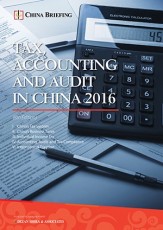Obtaining the Certificate of Chinese Tax Resident
By Omar Khan
International Business Advisory
Dezan Shira & Associates
Certifications and licenses are more important than one would imagine in China’s business market and tax system. A tax residency certificate, for example, is crucial for multinational companies when applying for tax benefits under international tax treaties, or in cases where a foreign company wants to prove that their subsidiary is compliant to China’s taxation laws. In this article, we introduce what is known as a Certificate of Tax Residency (中国税收居民身份证明), and provide detailed guidelines on how foreign expats and enterprises can obtain the certificate.
The Certificate of Tax Residency is a legal document issued by the tax bureau stating that the foreign company/employee is in tax compliance. Applying to both foreign nationals employed in China and foreign companies operating as subsidiaries, the certificate is extremely useful when it comes to having domicile, sourced income or residence in a country other than that of one’s origin.
The purpose of this certificate is to act as a legal proof that the specified foreign national is both, and already, a qualified Chinese Tax Resident and has their respective individual income tax being withheld by their employer. It also provides relevant authentication for those who wish to provide documentation to their country of origin jurisdiction.
 RELATED: Tax and Compliance Services from Dezan Shira & Associates
RELATED: Tax and Compliance Services from Dezan Shira & Associates
A detailed criteria and application process can be found below:
Expat Employee Applications
Chinese taxation has its own rules that are more or less contingent on time spent in China, sourced income location, taxpayer status, as well as applicable Double Taxation Agreements (DTAs) in place. Specifically, foreign individuals seeking to apply for the Chinese tax residency certificate must have held domicile in China for a minimum of one year. More can be found here on the various taxation parameters.
It should be clear that issuance of this certificate is not an automatic method of avoiding taxation requirements in foreign individuals’ home jurisdiction. Foreign employees are suggested to first communicate with their respective tax authorities in their home countries on the status and adequacy of the Certificate of Tax Residency.
A set of required documents are to be prepared for the local tax bureau:
- Application form
- Copy & original passport
- Copy of tax registration certificate of employer
- The original PRC individual income tax and other tax payment receipts (if no tax payment is provided a written explanation letter is required)
- Supporting documents for PRC residence days
- Other supporting documents required by the tax authority in charge
Company Applications
The requirements for foreign national individuals do not exist for subsidiaries. The following documents need to be submitted to the local tax bureau:
- Application form
- Copy and the original tax registration certificate
- Tax clearance certificate in the current fiscal year (if no tax payment is provided a written explanation letter is required)
A few specifics to keep in mind are that the application procedure might be different in practice and the time required for issuing the certificate can vary by region and tax authority. For example, in Shanghai, tax authorities can issue the certificate in five business days, while in Shandong province the process can take around 20 working days.
For more information on tax arrangements, processing a Certificate of Tax Residency, and application procedures for both individuals and companies, please contact china@dezshira.com.
|
Asia Briefing Ltd. is a subsidiary of Dezan Shira & Associates. Dezan Shira is a specialist foreign direct investment practice, providing corporate establishment, business advisory, tax advisory and compliance, accounting, payroll, due diligence and financial review services to multinationals investing in China, Hong Kong, India, Vietnam, Singapore and the rest of ASEAN. For further information, please email china@dezshira.com or visit www.dezshira.com. Stay up to date with the latest business and investment trends in Asia by subscribing to our complimentary update service featuring news, commentary and regulatory insight. |

 Tax, Accounting, and Audit in China 2016
Tax, Accounting, and Audit in China 2016
This edition of Tax, Accounting, and Audit in China, updated for 2016, offers a comprehensive overview of the major taxes that foreign investors are likely to encounter when establishing or operating a business in China, as well as other tax-relevant obligations. This concise, detailed, yet pragmatic guide is ideal for CFOs, compliance officers and heads of accounting who must navigate the complex tax and accounting landscape in China in order to effectively manage and strategically plan their China-based operations.
Managing Your Accounting and Bookkeeping in China
In this issue of China Briefing, we discuss the difference between the International Financial Reporting Standards, and the accounting standards mandated by China’s Ministry of Finance. We also pay special attention to the role of foreign currency in accounting, both in remitting funds, and conversion. In an interview with Jenny Liao, Dezan Shira & Associates’ Senior Manager of Corporate Accounting Services in Shanghai, we outline some of the pros and cons of outsourcing one’s accounting function.
 Employing Foreign Nationals in China
Employing Foreign Nationals in China
In this issue of China Briefing, we have set out to produce a guide to employing foreign nationals in China, from the initial step of applying for work visas, to more advanced subjects such as determining IIT liability and optimizing employee income packages for tax efficiency. Lastly, recognizing that few foreigners immigrate to China on a permanent basis, we provide an overview of methods for remitting RMB abroad.
- Previous Article Terminating a Contract on the Grounds of Resume Fraud in China
- Next Article Strategische Erwägungen bei der WFOE-Gründung in China, Teil 1: Geschäftsbereich und Grundkapital










